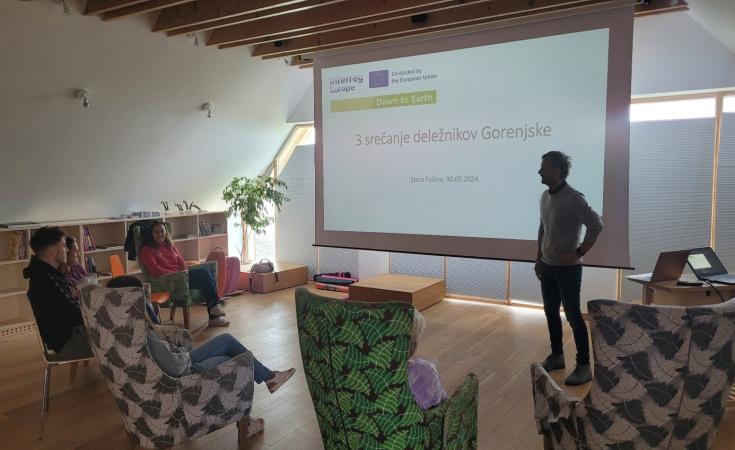Third Stakeholder Meeting in Slovenia on May 30th

On May 30th, our regional partner BSC Kranj organised the third Down to Earth Regional Stakeholder Meeting in the Gorenjska region. It took place in Stara Fužina and counted with the presence of eight participants, representatives of the Triglav National Park, Tourism Bohinj, and the private sector, among other institutions.
The main topics of the meeting were:
- Findings from the first Down to Earth year of studies
- The issues connected to studies of the second year: “Access barriers to young farmers in depopulated rural areas"
- Interregional meeting and study visit in Germany, Bad Urach
- Mid term event in Gorenjska, Slovenia
- Good practice cases related to the topic of "Access barriers to young farmers in depopulated rural areas"
To open the meeting, Helena Cvenkel, Down to Earth partner and representative of BSC Kranj, talked about the main findings of the first year of study; pointing out the aging, depopulation and influence of climate change on the countryside. Cvenkel presented briefly the main learnings from other project partner regions in connection with the first year of study. The vivid discussion took place in connection with main findings and how challenges can be addressed in the best way -also via policy change.
Then, Cvenkel continued by introducing the methodology and approach for preparation of the second year study, focused on the topic of "Access barriers to access for young farmers in depopulated areas". First, some statistical data were presented; e.g. size of farms and ownership of the farms, later on the discussion focused on the main challenges and opportunities, followed by a summary of the first inputs provided by stakeholders. Later on, the discussion centered on challenging aspects of young with opportunities to take over the farms (e.g. wider policies: educational, social policies, tax policies). Additionally it was clearly stated, that especially for smaller farms and farms that have harder conditions (e.g. higher attitude of the land) it is very hard to obtain subsidies from EU funds (due to low profitability of their farms). It was also stated that small calls for farms from local communities and support given by local value chains are very welcome and beneficial to young on farmers and smaller farms in general.
Helena Cvenkel then continued with a presentation of the upcoming study visit in Bad Urach, Germany, as well as an introduction to the identified German good practice cases. The participants were enthusiastic to hear about positive vibe especially of young farmers in Bad Urach area, the practices were discussed and its posibilities to trasfer in Gorenjska, Slovenia.
As a last point on the agenda, Cvenkel informed the present stakeholders about the coming 2025 mid term event that will be hosted in Gorenjska, Slovenia, during the month of February. Stakeholders then gave some inputs on how and in which way the mid term event and study visit could be organised and implemented.
